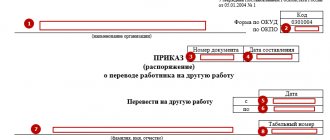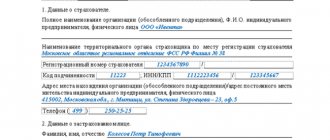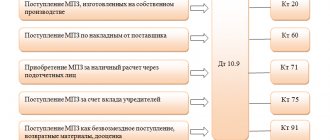Kontur.Accounting - 14 days free!
Personnel records and employee reports, salaries, benefits, travel allowances and deductions in a convenient accounting web service
Try it
Absenteeism is considered to be the absence of an employee from the workplace for more than 4 hours in a row during a working day or absence for the entire working day (shift) without confirmation of a valid reason (subclause “a”, paragraph 6 of Article 81 of the Labor Code of the Russian Federation). Absenteeism may result in disciplinary punishment, including dismissal.
The law does not provide for valid reasons for absenteeism. The employer must independently decide whether the reason for absenteeism is valid (Letter of Rostrud dated December 4, 2020 N PG/56975-6-1). To do this, you need to request from the employee an explanatory note and documents that will confirm the validity of the absence from work.
Valid reasons can be divided into groups:
- personal reasons;
- force majeure;
- documented permission from the employer.
Valid personal reasons for absenteeism
There are a huge number of life circumstances, and not all of them are valid. Let's look at some of them.
Disease. An employee may be absent from work in case of illness. Usually an employee has a sick leave certificate, but sometimes he can refuse this in order to maintain his salary. Then the employee must provide a doctor’s certificate indicating the date of appointment, an extract from the medical record, a certificate of calling an ambulance, etc. A similar situation is in the case of illness of a child or another family member, you need to provide a doctor’s certificate or take sick leave to care for the child.
A medical examination at some enterprises is a mandatory procedure under an employment contract (Article 213 of the Labor Code of the Russian Federation). If an employee did not take it on his own initiative and brought a certificate from a doctor, then absence is not considered absenteeism and is considered a valid reason. In addition, on the day of undergoing a medical examination, as well as donating blood, the employer is obliged not only to release the employee from work, but also to provide an additional day of rest and pay the average salary for these days (Article 186 of the Labor Code of the Russian Federation). Absence from work due to a medical examination, which an employee undergoes at his own request (even if prescribed by a doctor), is not considered valid. In such a case, you should always obtain the employer's permission.
Utility accident. Unexpected breakdowns in the utility sector include gas leaks, breakdowns of common building equipment, accidents, electrical short circuits, fires, etc.
An example of such a situation is considered in the Determination of the Eighth Court of Cassation of General Jurisdiction dated 06/09/2020 No. 88-10036/2020. The employer fired an employee who did not come to work due to a break in the hot water supply riser. She was not at work for more than 4 hours - during the accident itself from 7:00 to 13:00 and then during repair work until the end of the working day (16:18). The court considered the absence due to a breakthrough to be a valid reason, but immediately after the accident was repaired, the employee had to report to work. But since the period of absenteeism without a valid reason did not exceed four hours, the employee was reinstated at work.
Court. Participation in a lawsuit will also be a valid reason: for example, if an employee is in court as a plaintiff or defendant under a subpoena. Participation in a court hearing for one’s defense is a constitutional right of a citizen (Article 46 of the Constitution of the Russian Federation). In addition, calls and appeals from courts are mandatory for all government bodies, officials, citizens without exception and are subject to execution throughout Russia (Part 2 of Article 13 of the Code of Civil Procedure of the Russian Federation). These conclusions are confirmed by judicial practice: Cassation ruling of the Khabarovsk Regional Court dated December 16, 2011 in case No. 33-9086, Determination of the Moscow Regional Court dated May 11, 2010 in case No. 33-9048/2010.
Moreover, if in court an employee acts as a representative of one of the parties, absenteeism will most likely not be considered valid. This is the judicial practice (Appeal ruling of the Moscow City Court dated 02/12/2018 N 33-5079/2018, Appeal ruling of the Bryansk Regional Court dated 06/02/2015). The thing is that in civil proceedings, representation is voluntary, so absenteeism will not be excused.
Non-payment of wages. If the employer delays wages for more than 15 days, the employee has the right to suspend work until the delayed amount is paid, notifying the employer in writing in advance. However, it is impossible to suspend work during a period of martial law, a state of emergency, in bodies and organizations of the Armed Forces of the Russian Federation, by civil servants and in other cases (Article 142 of the Labor Code of the Russian Federation). This is confirmed by practice (Appeal ruling of the Krasnoyarsk Regional Court dated 01/14/2015 in case No. 33-48, B-13, Appeal ruling of the Chelyabinsk Regional Court dated 02/26/2015 in case No. 11-1996/2015).
Arrest . If the court has placed an employee under administrative arrest, absenteeism can be considered excused, since absence from work does not depend on the will of the employee. The courts reinstate employees dismissed for absenteeism for this reason (Cassation ruling of the court of the Yamalo-Nenets Autonomous Okrug dated April 14, 2011 in case No. 33-940, Appeal ruling of the Altai Regional Court dated December 11, 2013 in case No. 33-9126/2013).
Study leave . An employee who combines work and study has the right to additional leave while maintaining average earnings. The employer is obliged to provide it (Articles 173 - 176 of the Labor Code of the Russian Federation). If the employer refuses leave and the employee goes on it without permission, this cannot be considered absenteeism. In this case, the employee is obliged to provide a certificate of summons from an educational institution or another document. This is confirmed by judicial practice (Determination of the Moscow City Court dated September 16, 2013 N 4g/8-9629).
Keep records, pay salaries, taxes and contributions, report via the Internet to Kontur.Accounting. The web service itself will calculate the amounts, select transactions, and generate reports. Get free access for 14 days
Arrest
What else could be a good reason for not coming to work on time? We already know examples of some scenarios for the development of events. But, as a rule, the conversation does not end there. In general, there is no clear list in the Labor Code. So all responsibility for this problem falls on the shoulders of the employer, not the employee. After all, it is he who will be punished and held accountable if the citizen was fired for absenteeism, but in fact there was a good reason for the absence.
Possible scenarios for the development of events also include arrest. If you are arrested for one reason or another or detained by law enforcement officers as a witness, no one has the right to fire you. And even more so, punish by deprivation of a bonus, for example. It is usually easy to alert an employer that you have been arrested or called as a witness—just request a call.
Force majeure situations
A traffic accident or transport malfunction are valid reasons if, in the event of a public transport malfunction, it is impossible to get to the workplace by other transport. This also includes a flight delay when returning from a business trip, vacation or other trip, being in the traffic police department while investigating an accident.
Epidemiological situation . If the employer has previously recommended that employees not be present at the workplace if coronavirus is suspected, the dismissal will be considered disrespectful. Especially if the employee previously notified his immediate superior about the possible illness (Decision of the Third Cassation Court of General Jurisdiction dated March 31, 2021 N 88-5838/2021).
Public transport disruptions, weather conditions and natural disasters also fall into this category. At the same time, it is important to confirm that the circumstances were truly serious and prevented them from reporting to work. Links to messages from the Ministry of Emergency Situations, media, transport services, etc. are suitable.
Documented permission from the employer
Sometimes the reasons for missing a day of work are known in advance: a wedding, the birth of a child, an examination session in educational institutions and other reasons. In such cases, the employee has the right to additional unpaid days off, which are not considered absenteeism. To do this, the employee warns the employer in writing. At the birth of a child, registration of marriage, death of close relatives, the period for granting leave is set at 5 calendar days. For other family circumstances and valid reasons, leave is granted by agreement between the employee and the employer (Article 128 of the Labor Code of the Russian Federation).
Unauthorized use of rest days
In general, an employee cannot voluntarily use days off or go on vacation, even if it is provided without pay.
At the same time, it will not be absenteeism if the employee uses rest days that the employer was legally obligated to provide him with, but did not want to. For example:
- leave without pay for an old-age pensioner (Part 2 of Article 128 of the Labor Code of the Russian Federation);
- leave without pay upon registration of marriage, if the employee submitted an application (Article 128 of the Labor Code of the Russian Federation);
- vacation according to the approved vacation schedule, but without agreement with the employer (parts 2, 3 of article 123 of the Labor Code of the Russian Federation);
- leave to care for a child up to three years old upon submission of an application (Article 256 of the Labor Code of the Russian Federation);
- study leave to prepare for the thesis and its defense, passing state exams (Article 173 of the Labor Code of the Russian Federation);
- additional days off for caring for a disabled child upon application (Part 1 of Article 262 of the Labor Code of the Russian Federation).
Documented permission from the employer
Sometimes the reasons for missing a day of work are known in advance: a wedding, the birth of a child, an examination session in educational institutions and other reasons. In such cases, the employee has the right to additional unpaid days off, which are not considered absenteeism. To do this, the employee warns the employer in writing. At the birth of a child, registration of marriage, death of close relatives, the period for granting leave is set at 5 calendar days. For other family circumstances and valid reasons, leave is granted by agreement between the employee and the employer (Article 128 of the Labor Code of the Russian Federation).
Emergency work
Life is something that cannot be foreseen or predicted with certainty. Various incidents and surprises can happen to anyone, no one is immune from this. Therefore, you need to constantly think about what could be a valid reason for absenteeism.
We have already met some points. But, as already mentioned, there is no exact list anywhere. Each case is considered separately, and the employer bears responsibility for punishment if the employee has a good reason. The following scenario is nothing more than an urgent repair of an employee’s house/apartment. If a repairman arrives, access to the home must be provided immediately. And at the same time, failure to show up for work under such circumstances will not be considered absenteeism.
There is also a nuance here: all emergency repair work should not be carried out at the request of an absent employee. In other words, we are talking only about forced measures. But if you decide to call, for example, a plumber to your home instead of going to work, your absence will be considered absenteeism.
How to justify the reason for absenteeism
If an employee is absent from the workplace for a valid reason, it must be confirmed. In the absence of a valid reason, failure to appear will be recognized as absenteeism, which entails dismissal (Article 81 of the Labor Code of the Russian Federation) or the imposition of a disciplinary sanction on the employee.
Art. 56 of the Code of Civil Procedure of the Russian Federation states: “Each party must prove the circumstances to which it refers.” That is, the employee must prove that he was absent for a good reason, and the employer, for his part, must prove the very fact of the employee’s absence. For an employer, such evidence may be an employee’s absence certificate, data from electronic systems for the arrival and departure of employees, and testimony of witnesses. For an employee, this is a sick leave certificate, documents about an accident drawn up by a police officer, an apartment flood report and other documents.
If the employee does not provide evidence, the decision remains with the employer. For example, in the case of an illness of an employee who did not go to a medical facility and does not have documentary evidence, recognition will depend on the decision of the employer, the reputation of the employee and the degree of trust in him by management.
The employee must inform the employer about his absence by telephone, orally or in another way, if possible, documenting a valid reason for absenteeism (a summons, a document from a medical institution, etc.). Documentary evidence is more reliable and will help the employer make an informed decision, or cancel the imposed penalty for failure to appear.
What is considered truancy?
To understand whether a person’s absence constitutes absenteeism, you should refer to the norms of the Labor Code of the Russian Federation. The exact definition of absenteeism is given in subparagraph “a” of paragraph 6 of Art. 81 of the Labor Code of the Russian Federation - this is recognized as the absence of an employee from the workplace for more than 4 hours in a row during the working day or throughout the entire shift and at the same time the employee does not have valid reasons for such absence.
In practice, there are valid and disrespectful reasons for absence from work. Employers independently decide which category to classify an employee’s failure to appear in, since the Labor Code of the Russian Federation does not strictly regulate this point. If an employee had good reasons for not coming to work, but the employer refuses to recognize his arguments and fires him, the employee has the right to appeal such a decision in court.








